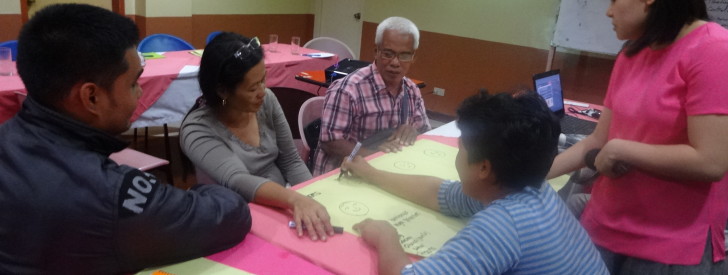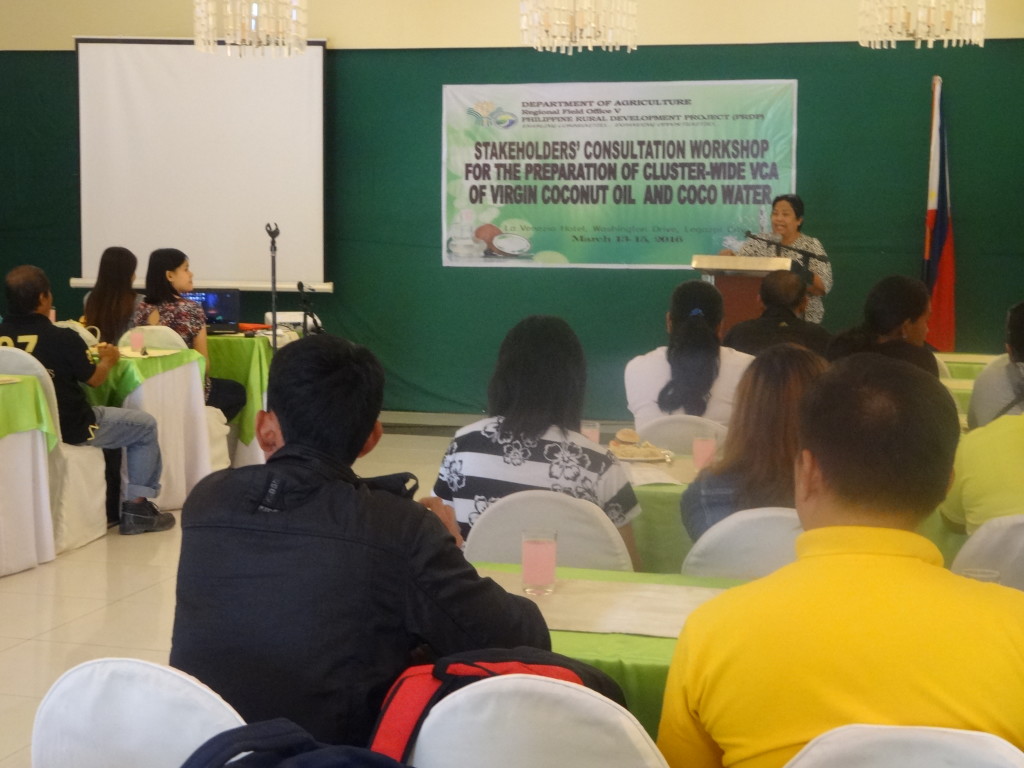 PRDP South Luzon Planning Officer Kristine Lea Climaco (in pink) assists a group of farmers from Catanduanes in identifying their interfirm relations during the Stakeholders Consultation Workshop for the Preparation of Clusterwide VCA of Virgin Coconut Oil and Coco Water
PRDP South Luzon Planning Officer Kristine Lea Climaco (in pink) assists a group of farmers from Catanduanes in identifying their interfirm relations during the Stakeholders Consultation Workshop for the Preparation of Clusterwide VCA of Virgin Coconut Oil and Coco Water DA PRDP maps out interventions for Bicol’s coco farmers using value chain analysis
For the last two years, the Department of Agriculture’s Philippine Rural Development Project (DA PRDP) had been conducting value chain analysis (VCA) of provincial commodities to identify appropriate Project interventions. In Bicol, these include VCAs on geonet, coco sap sugar and abaca as well as sweet potato, pineapple, and cassava. DA PRDP also capacitated partner LGUs in preparing VCAs for mangrove crab, goat, coconut shell charcoal, seaweeds and pili. VCA is one of the science-based tools being used by PRDP to identify existing and potential market opportunities to boost growth, determine constraints affecting the commodity or industry and describe interfirm relations’ nature. In addition, VCA intends to identify catalysts to promote the development of the identified commodities/products.
According to Rey Lara, PRDP South Luzon I-PLAN Component Head, majority of the players in the country’s coconut industry are in South Luzon. Based from the commodity prioritization conducted by his team, which ranked commodities based on suitability, market potential, impact on the poor and number of growers and producers, coconut, particularly coco water and virgin coconut oil (VCO), is a very promising industry that offers opportunities to increase coconut farmers’ income. Four out of six provinces in Bicol namely Camarines Norte, Catanduanes, Albay, and Sorsogon belong to the Philippine Coconut Authority’s list of 29 provinces considered highly suitable for coconut production with average achievable annual yields of 11,250 nuts per hectare.
To scale up the coconut industry in South Luzon, including Bicol, Lara and the I-PLAN team conducted a series of Stakeholders Consultation Workshop for the Preparation of Clusterwide VCA of Virgin Coconut Oil and Coco Water. The last leg which was held in Legazpi City, Albay and Virac, Catanduanes on March 14-17, 2016.
“Coco water and VCO are promising industries that would benefit farmers, have support services, players, mature market and opportunities for income generation,” Lara said.
The Asian and Pacific Coconut Community reports that the Philippines exported 16,685,350 liters of coconut water valued at US$15.113 million in 2012. Meanwhile, the country exported 6,002 metric tons of VCO with prices ranging from US$3,500 to US$4,600 per ton.
Demand for VCO rose as it is proven effective as food supplement and as a massage oil. It is also used in producing personal care products and cosmetics. Coco water, on the other hand, is now being positioned as a natural source of electrolytes, which generate energy, keep the body hydrated and restore its balance.
The stakeholders’ consultation gathered about 75 input suppliers, coconut farmers, traders, and processors from all provinces of Bicol, except Masbate to determine the coconut industry’s current situation in the region, map out the future of the industry with DA PRDP’s intervention.
Coconut farmers Domingo G. Alcantara of Catanduanes and Flor L. Olivar noted that majority of the coconut farmers in the region are still engaged in traditional coconut farming and copra processing. They shared that coconut farmers’ incomes are often unstable due to typhoons and insect pests that damage their crops. With DA PRDP and other government agencies’ support, they envision a more specialized and vibrant coconut industry that uses upgraded facilities and technology, good agricultural practices and benefits from world-class farm-to-market roads.
PRDP South Luzon Planning Officer Kristine Lea Climaco underscored that using the VCA, the government now has a science-based new system in identifying projects to invest on.
“Walang masasayang, lahat mapapakinabangan, pantay-pantay lahat ng players (Nothing will be wasted, everything will be profitable, players will have equal benefits),” Climaco said.
Albay Philippine Coconut Authority (PCA) Provincial Manager Edmundo R. Bailon enjoined stakeholders to put their stake in the Project while Mercy R. Salazar of PCA Camarines Sur underscored the importance of sustainability of production in engaging in VCO and coco water.
Moreover, Leonor T. Tasarra, in charge of PCA-Catanduanes, said “Instead na copra lang, yung tubig, magagamit pa. Tataas ang value ng coconut products. May mga health benefits pa ang VCO at coco water (Instead of merely copra processing, coconut water will be maximized. This will add value to coconut products plus VCO and coco water have many health benefits.” Tasarra assured PCA’s commitment to support the Project as a partner agency.
Lara further explained that the clusterwide VCA for VCO and coco water will engage the PRDP South Luzon I-PLAN team and its regional and provincial counterparts to commit to the Project and add the VCA findings about the said commodities in their respective Provincial Commodity Investment Plans (PCIPs), which will be the basis of proposed PRDP sub-projects.
“This will also attract investors as PCIP is now being mainstreamed in the Provincial Physical Framework Plan,” he added.
The I-PLAN team targets to finish the clusterwide VCA report, the first of its kind in the PRDP implementation nationwide, by April 2016 to get the National Office’s approval by May 2016.
The Philippines is the second largest producer of coconut worldwide with 68 out of 81 provinces engaged in coconut production. As of 2012, 25 million Filipinos depend on the coconut industry. Ironically, reports from the National Anti-Poverty Commission (NAPC) show that coconut farmers belong to the rural poor with the highest level of poverty incidence at 60%.
PRDP is a six-year project being implemented by the DA aimed at increasing farmers’ income and developing an inclusive, market-oriented and climate-resilient agri-fishery sector. (Annielyn L. Baleza, I-SUPPORT InfoACE Unit, DA-RAFIS 5)

PRDP Bicol I-PLAN Component Head Aloha Gigi I. Bañaria addresses the partici pants of the Stakeholders Consultation Workshop for the Preparation of Clusterwide VCA of Virgin Coconut Oil and Coco Water. The stakeholders’ consultation gathered about 75 input suppliers, coconut farmers, traders, and processors from all provinces of Bicol, except Masbate to map out issues affecting the coconut industry and determine accurate and ideal PRDP interventions to raise coconut farmers’ income.
